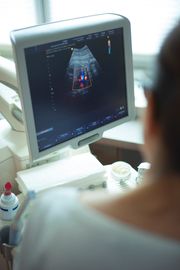
No matter how long your pregnancy lasts, a miscarriage is never easy to accept. By learning about this medical issue and why it may have occurred, you can start healing and planning the next steps. Whether you’re considering trying again or scheduling infertility treatments, use the following guide to get started.
4 FAQ About Miscarriages
Why does it happen?
In most cases, early pregnancy loss is the result of an unusual amount of cell chromosomes. Chromosomes carry the genes that dictate the traits an embryo will develop—healthy cells will receive 23 chromosome pairs. If an embryo gets an abnormal amount, it may not be able to continue growing.
When do they typically occur?
A loss within the first 13 weeks of pregnancy is considered a miscarriage. Women over 40 are 33% likely to experience early pregnancy loss because chromosomal miscount is a common issue in this age range.
How can I tell if I’m dealing with a miscarriage?
 Usually, the first signs of a miscarriage are pain in the abdomen and vaginal bleeding. However, since some spotting is common at the beginning of a healthy pregnancy, it isn’t always a cause for concern.
Usually, the first signs of a miscarriage are pain in the abdomen and vaginal bleeding. However, since some spotting is common at the beginning of a healthy pregnancy, it isn’t always a cause for concern.
To know for sure, you’ll need to see an OB-GYN. They can perform a physical exam and an ultrasound to check on the embryo and locate a heartbeat.
Which infertility treatments can help?
After a miscarriage, you may begin ovulating in as little as two weeks. However, if you’re also dealing with infertility, you may benefit from various treatments, like in-vitro fertilization. This process involves fertilizing the eggs with sperm in a laboratory. If the fertilization is successful, the embryos can be implanted into the uterus.
While the sperm and eggs may be you and your partner’s, they can also be donated from another individual. In cases where age or a genetic condition is increasing the risk of early pregnancy loss, this solution may help you grow your family.
If you’re interested in learning more about infertility treatments, reach out to IVF HAWAII in Honolulu. These medical professionals will walk you through your options and create a custom plan to help you conceive. To get more information about their services, send a message online or call (808) 538-6655.
About the Business
Have a question? Ask the experts!
Send your question

